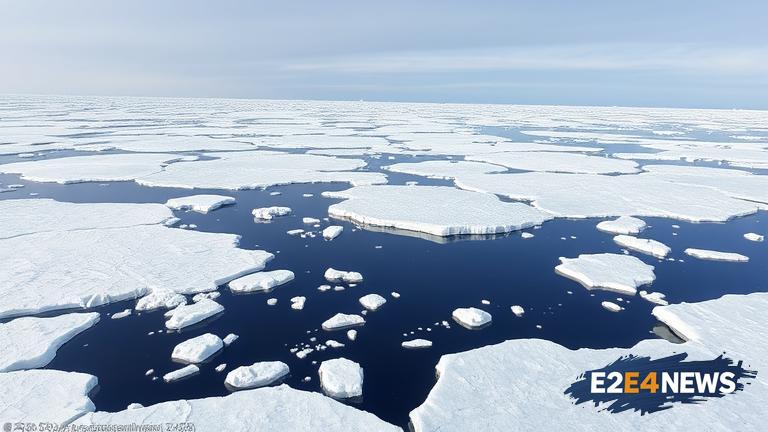Researchers have been left stunned by an unexpected slowdown in Arctic sea ice melt, a trend that has sparked debate about the impact of climate change on the region. The Arctic sea ice has been melting at an alarming rate over the past few decades, with some predictions suggesting that it could disappear entirely by the summer of 2040. However, recent data has shown that the rate of melting has slowed down significantly, leaving scientists scrambling to understand the reasons behind this unexpected trend. The slowdown in Arctic sea ice melt has been observed over the past few years, with the extent of the ice cover increasing by a small amount. While this may seem like a positive development, it has raised concerns among researchers who are trying to understand the implications of this trend. One of the main reasons behind the slowdown in Arctic sea ice melt is thought to be the natural variability of the climate system. The Arctic region is known to experience fluctuations in temperature and sea ice cover over time, and it is possible that the current slowdown is simply a part of this natural cycle. However, other factors such as changes in ocean currents and atmospheric circulation patterns may also be playing a role. Researchers are currently studying the data to determine the exact causes of the slowdown, but it is clear that the trend is complex and multifaceted. The slowdown in Arctic sea ice melt has significant implications for the region’s ecosystem, as well as for global climate patterns. The Arctic sea ice plays a crucial role in regulating the Earth’s temperature, and any changes to its extent or thickness can have far-reaching consequences. For example, a reduction in sea ice cover can lead to an increase in the amount of solar radiation that is absorbed by the ocean, which can in turn accelerate the rate of global warming. On the other hand, an increase in sea ice cover can help to reflect sunlight and cool the planet. The slowdown in Arctic sea ice melt has also raised questions about the accuracy of climate models, which have consistently predicted a steady decline in sea ice cover over the coming decades. While the models have been successful in predicting many aspects of climate change, they have struggled to capture the complexity of the Arctic region. The slowdown in Arctic sea ice melt is a reminder that the climate system is inherently unpredictable, and that there is still much to be learned about the factors that drive change in the region. Despite the uncertainty surrounding the slowdown, researchers are continuing to study the data and refine their models. By better understanding the causes and implications of the slowdown, scientists hope to improve their predictions and provide more accurate information to policymakers. The Arctic region is a critical component of the global climate system, and any changes to its sea ice cover can have significant implications for the environment and human societies. As researchers continue to study the slowdown in Arctic sea ice melt, they are also exploring the potential consequences of this trend for the region’s ecosystem and for global climate patterns. For example, a reduction in sea ice cover can lead to an increase in the amount of habitat available for certain species, such as polar bears and seals. On the other hand, an increase in sea ice cover can help to protect these species and their habitats. The slowdown in Arctic sea ice melt is a complex and multifaceted trend that requires careful study and analysis. By continuing to monitor the data and refine their models, researchers hope to gain a better understanding of the causes and implications of this trend, and to provide more accurate information to policymakers and the public. The Arctic region is a unique and fascinating environment, and any changes to its sea ice cover can have significant implications for the environment and human societies. As researchers continue to study the slowdown in Arctic sea ice melt, they are also exploring the potential consequences of this trend for the region’s ecosystem and for global climate patterns. The slowdown in Arctic sea ice melt is a reminder that the climate system is inherently unpredictable, and that there is still much to be learned about the factors that drive change in the region. Despite the uncertainty surrounding the slowdown, researchers are continuing to study the data and refine their models, with the goal of improving their predictions and providing more accurate information to policymakers and the public.
